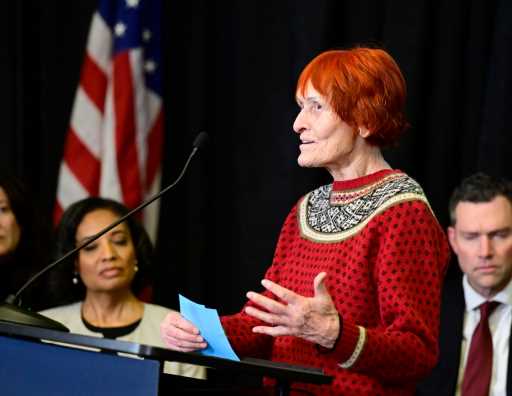Denver mayor election: Renate Behrens has some big ideas for the city
Renate Behrens got on the ballot for the 2023 Denver mayor’s race the hard way. She collected all of the 300 qualifying voter signatures she needed herself. It was a difficult process that she says included being run off from a King Soopers parking lot.
She’s proud of the outcome. And questions the commitment of more well-known candidates who hired petition circulators.
“What kind of mayor would be that that doesn’t listen to the hopes and sorrows of the public?” Behrens said. “And I did that. I did everything in person and it was very hard, I can tell you.”
It’s one of many things that sets Behrens apart in the 17-candidate field. Her vivid red hair and the sandwich board sign she wears to events stand out as others.
Some of her idiosyncrasies put her at a disadvantage. While most of her opponents are running a full-court press of online campaigning, posting on Twitter, TikTok and Facebook to get their faces and platforms in front of voters, Behrens doesn’t even have a campaign website. A German immigrant, she said she comes from a culture that favors print publications over the internet.
She’s raised just $21, “$20 from a rich man and $1 from a poor man,” she says.
Behrens is forthright about why she is running. She is a senior with no income, no health insurance and substantial medical debt. The mayor’s office currently pays $188,429 per year. The municipal election is a big job interview for Behrens.
“One half is because I want to serve the country because the country didn’t do anything for me,” Behrens said of her motivations. “And the other one: I need a job.”
Hailing from a portion of Germany that is now part of Poland, just east of the Oder River, Behrens said she had traveled in North America before but had never been to Colorado before 2007. That is when she came to meet her eventual husband, a man she met by responding to an ad in a German newspaper.
She now describes her marriage as human trafficking.
Her husband was in poor health and needed constant care, which she provided. But when he asked for a divorce in 2014, she found herself totally locked out of his estate. With no income and not even Social Security to fall back on, she was homeless.
“I lived partly in my car, in a hotel, whatever was available,” she said of the period, which lasted for a few months before a friend allowed her to stay in a cabin in the mountains.
Eventually, her brother helped her buy a condo in Windsor Gardens, a senior living community nestled in the southeast corner of Denver where she still lives today.
Through that experience and through working in a kitchen that served unhoused people, Behrens developed a unique perspective on homelessness, an issue she proposes to solve in part by repurposing vacant buildings throughout the city as housing.
“They are always trying to tell us that the homeless people are in need of mental health treatment. I don’t think so,” Behrens said. “They are people just like you and me. Most of them had a horrible experience somewhere, maybe a divorce or something else that threw them out of their track, out of their life.”
She said many just need a safe place to “regain their balance.”
Related Articles
Politics |
Denver voters hear from 16 mayoral candidates in wide-ranging debatePolitics |
“Who is included in their Denver?” The 2023 mayor’s race could set agenda for the next decadePolitics |
Field of candidates to replace Denver Mayor Michael Hancock narrows as key deadline passes
Behrens has other bold ideas. She wants to fight Denver’s pollution by immediately offering free, high-quality public transportation to get rid of commuter cars. With fewer cars on the streets, parking spaces can be repurposed as gardens and playgrounds, she said.
“Some people say I’m a dreamer. That’s OK,” Behrens said. “As long as I’m dreaming, I’m still alive and I’m still happy.”
Stay up-to-date with Colorado Politics by signing up for our weekly newsletter, The Spot.
Source: Read Full Article


